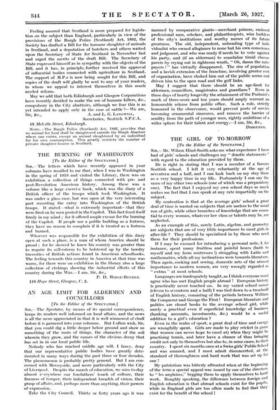AN AGE LIMIT FOR ALDERMEN AND COUNCILLORS
[To the Editor of the SPECTATOR.] SIR,—TliC Spectator, by means of its special correspondence, keeps its readers well informed on local affairs, and the news is all the more appreciated in that it is well winnowed of chaff before it is garnered into your columns. But I often wish, Sir, that you could dig a little deeper below ground and show us something of the roots of things, the character of the soil wherein they grow, and the causes of the obvious decay that has set in in our local public life.
Nobody who has reached middle age will, I fancy, deny that our representative public bodies have greatly dete- riorated in many ways during the past three or four decades. The phenomenon is probably pretty general. But I am con- cerned with Merseyside, and more particularly with the City of Liverpool. Despite the march of edueation; we miss to-day almost everywhere our forefathers' touch of culture, their fineness of temper, their independent breadth of vision,- their grasp of affairs, and, perhaps more than anything, their powers of expression.
Take the City Council. Thirty or forty years ago it was manned by comparative giants—merchant princes, eminent professional men, scholars, and philanthropists, wise builders of the city's institutions and worthy nurses of its future greatness. The old, independent, unbending type of indi- vidualist who owned allegiance to none but his own conscience and judgment, and who was ready if needs be to vote against his party, and (if an alderman) to scandalize timid cheese- parers by crying out in righteous wrath, " Oh, damn the rate- payers ! " has virtually disappeared. The rise of population and a lavish extension of the franchise, involving greater cost of organization, have choked him out of the public arena and driven him to the open road and the golf links.
May I suggest that there should be an age-limit for aldermen, councillors, magistrates and guardians ? Even in these days of hearty longevity the attainment of the Psalmist's mark of three-score and ten years should amply warrant an honourable release from public office. Such a rule, strictly honoured in the observance, would prevent posts of service becoming ornamental sinecures, and remove the barrier of senility from the path of younger men, rightly ambitious of a wider sphere for their talent and energy.—I am, Sir, &c.,
DIOGENES.






















































 Previous page
Previous page